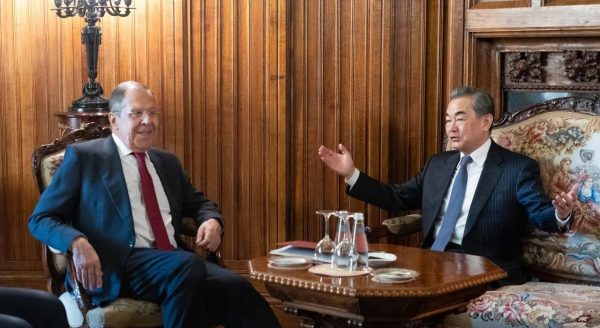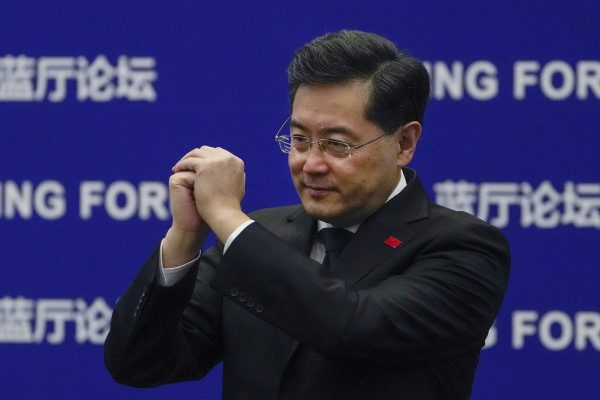
China Continues to Play Both Sides in the Ukraine War
Wang Yi, recently promoted from China’s foreign minister to the head of the Chinese Communist Party’s Central Foreign Affairs Office, has had a busy week. He centered a tour of Europe around attendance at the Munch Security Conference on February 18, where he also met with US Secretary of State Antony Blinken. And Wang concluded his Europe tour with a trip to Moscow – the first by a high-ranking Chinese diplomat since Russia invaded Ukraine almost exactly a year ago.
Given that timing, Ukraine was first and foremost on the agenda during Wang’s travels, which brought him to France, Italy, Germany, Hungary, and Russia from February 14 to 22.
For China, Wang’s trip was largely an attempt at damage control. China-Europe relations have been fraying for years over concerns about economic policy and human rights abuses, but Beijing’s refusal to directly condemn Russia’s invasion of a fellow European state set off major alarm bells in European capitals. While China has repeatedly decried other countries for “smearing” its position on what Beijing calls “the Ukraine crisis,” it has not managed to convince European states that the widespread perception of China’s “pro-Russia neutrality” is some sort of misunderstanding.
Michael Clarke put it in his analysis of Wang’s trip to Europe, China’s approach “is constrained by two major factors: an over estimation of European capitals’ desire to remain at arm’s length from deepening Sino-US rivalry and an under estimation of the impact of the Russian invasion of Ukraine on European security postures and perceptions.
In all his stops in Europe, Wang was told by European counterparts that China must make use of its leverage over Russia to push for peace in Ukraine. Wang repeatedly attempted to reassure his hosts that China iscommitted to promoting peace talks,” but didn’t have much to offer in the way of new pledges. One of the biggest takeaways was a comment by the italian foreign ministerwho said he’d been told that Chinese President Xi Jinping was planning to “deliver a peace speech on the anniversary of the invasion of Ukraine.”
But for those expecting China to do more, keep in mind that in Wang’s framing, Beijing has already been doing plenty. At the Munich Security ConferenceWang told the audience China has been pushing for peace negotiations “since the second day of the conflict’s breakout.” He claimed that “Russia and Ukraine did hold quite a number of rounds of negotiations and made significant progress. Actually the framework for a peace deal had already been put on the table. But then things fell apart. By way of explanation, Wang darkly stated that “Some people do not want peace talks to succeed or fighting to stop.”
He “stressed that this conflict should not go on any more” and promised that China would soon publish “a position document on the political settlement of the Ukraine crisis.” Based on Wang’s description, the policy paper will reiterate several principles of key importance to China – that “the sovereignty and territorial integrity of all countries should be respected” and “the legitimate security concerns of all countries should be taken seriously.” Unfortunately for China, those positions are mutually exclusive in the Ukraine war.
As Ukraine’s Foreign Minister Dmytro Kuleba emphasized to Wang during their meeting on the sidelines of the Munich Security Conference, a peaceful settlement of the Ukraine war must ensure that Russia’s aggression is not rewarded with new territory. “We agree that the fundamental UN Charter principle of territorial integrity is sacred for both of our states,” Kuleba told Wang. “I reiterate that all initiatives aimed at restoring peace in Ukraine need to be based on it.”
However, Russia has already moved to annex substantial portions of Ukrainian territory, insisting that the move was necessary for its own security and the security of ethnic Russians living in Ukraine’s Donbas region and Crimea. As long as China backs Russia’s “legitimate security interests,” it cannot give any meaningful support to Ukraine’s “sovereignty and territorial integrity.”
As a clear sign of that position, Wang capped off his European tour with a trip to Moscow, where he met with Russian President Vladimir Putin. In their meeting, Wang commented that China-Russia relations “certainly cannot be subject to pressure from any third countries” – a clear dismissal of the idea that Beijing will allow Brussels or Washington to dictate its Russia policy.
Wang also told Russia’s foreign minister, “No matter how the international situation changes, China has been and remains committed, together with Russia, to make efforts to preserve the positive trend in the development of relations between major powers.”
For his part, Putin praised the “new frontiers” reached by China-Russia relations, and said both sides had “agreed” that Xi would soon travel to Moscow himself. The Chinese leader has not visited Russia since the invasion of Ukraine, although he did meet in person with Putin on the sidelines of the 2022 Shanghai Cooperation Organization summit in Uzbekistan.
Wang also reassured the head of Russia’s National Security Council that China is “ready to join forces with the Russian side… to stand up decisively for national interests and virtues.”
That promise is being received with alarm at a time when the United States is warning that China may begin to provide direct military aid to Russia. Discussions of an alleged Chinese surveillance balloon dominated headlines of the Blinken-Wang meeting in Munich, but Blinken’s comments on Ukraine may be more meaningful in the long term. According to the State Department read-out, Blinken “warned about the implications and consequences if China provides material support to Russia or assistance with systemic sanctions evasion.”
Depending on who you ask, then, China is poised either to lean harder into supporting Russia, or to back away from Moscow and support a turn toward negotiated peace. This is exactly the balancing act Beijing wants to strike. As long as European capitals – including Kyiv – believe there is a chance China could play a constructive role in pressuring Russia to end the war, they will continue to engage.
Meanwhile, Beijing can quietly continue its largely rhetorical support to Moscow, which has proved enough to keep an important relationship afloat at minimal cost to China.

